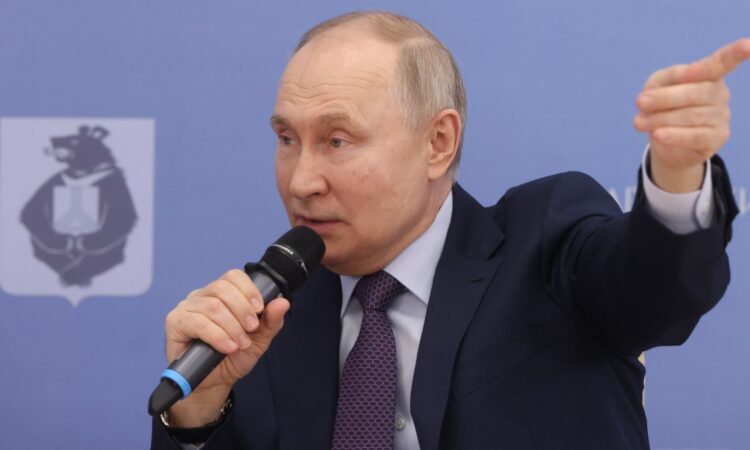
President Putin has boasted that Russia is now Europe’s largest economy despite efforts by western countries to “strangle” Moscow over the war in Ukraine.
Speaking in Khabarovsk, a city in the far eastern region, Putin said that Russia was the fifth biggest economy in the world behind China, the United States, India and Japan.
“This is an amazing result. We appear to be strangled and pressured from all sides but in terms of the volume of the economy as a whole, we have become number one in Europe,” he told business people. “We have overtaken Germany.”
Putin’s comments were based on Russia’s purchasing power parity, an instrument used by the World Bank to compare how much people can buy with their national currencies when they are converted into the same unit, usually the dollar.
Russia jumped ahead of Germany on this measure last year, statistics show. In terms of GDP, however, Russia’s economy is the world’s 11th largest, just ahead of Mexico. “On GDP, we still have work to do,” Putin admitted.
He also said Russia’s GDP may have grown by more 4 per cent last year, which would be higher than the 3 per cent predicted for the global economy by the International Monetary Fund.
Some analysts have suggested that Moscow distorts its figures, especially on inflation, to provide the illusion of economic stability. Annual inflation is officially about 7.5 per cent but some fruits and vegetables have soared in price by 80 per cent and higher since last year.
Putin was forced to apologise during his annual question and answer show in December for an unexpected spike in the price of eggs, which rose by 40 per cent last year. He returned to the issue again today, saying that rising real incomes had sparked a rush on the purchases of eggs, a comment that was widely mocked.
However, predictions that Russia’s economy would collapse under the weight of western sanctions imposed on Moscow over its invasion of Ukraine have so far proven to be inaccurate. Restaurants and shops in Moscow and other cities are full and the number of people classified as living in poverty has dropped from 15 per cent to 9 per cent, its lowest level since the early 1990s, while unemployment is also down.
Russia has been able to offset the loss of revenues from oil and gas sales to the West with increased purchases by China and India. The country’s economy is also being boosted by massive spending on the war. Expenditures on the armed forces now account for a third of the national budget for the first time since the Soviet era.
The minimum monthly salary for new recruits is 160,000 roubles (£1,420), which is around three times higher than the average national wage. The Kremlin has also ramped up its production of weaponry, with factories working around the clock to pump out missiles, ammunition and other armaments.
“The Russian economy looks pretty resilient and I don’t see any major crisis in 2024,” said Alexandra Prokopenko, an independent analyst who is a former adviser to the Bank of Russia. “But without military spending, the figures would be completely different. Long term, the perspective is not so bright. We will see the implications of [western] technological sanctions, which will limit the potential growth of the Russian economy.”
Prokopenko said not everyone was benefiting from increased military spending and that the country’s “egg problem” was partly due to poorer Russians now being unable to afford meat.
“Eggs are the cheapest source of protein for pensioners and people with kids. So they changed their consumption from meat to eggs. And this is also a reason for egg shortages and egg inflation,” she said.

Inflation has left many Russians feeling the squeeze on their household budgets
AP
Crumbling infrastructure dating from the Soviet era is also causing increasing problems. Homes across Russia have been left without heat amid temperatures as low as minus 25C due to failures with boilers and hot water pipes in recent days.
In Podolsk, a town about 25 miles south of Moscow, 150,000 residents were plunged into the cold when a mains pipe burst. In Novosibirsk, the biggest city in Siberia, 200 homes lost heating after another pipe ruptured, flooding streets in temperatures of minus 15C.






